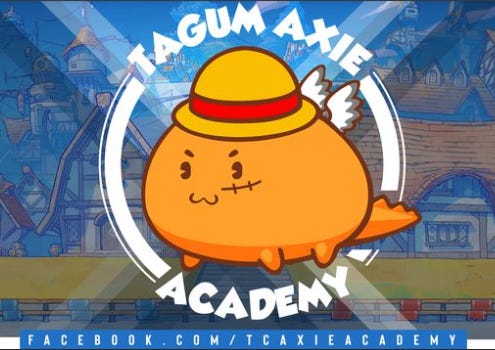An Axie Archipelago
CRYPTODAY 038
Before we dive into more tax discussions today I wanted to give a couple of quick shoutouts to two awesome Axie guilds focusing on Filipino scholars. The first is Tagum City Axie Academy, a guild that’s based in Davao Del Norte. Iñigo T from the TCAA wrote in on Wednesday to talk about their program, and how they’re completely self-organized and working to provide other Tagum City residents with alternative income via play-to-earn.
You can follow them on Facebook right here. Thanks for all your efforts, TCAA, and please let us know how we can help you grow your scholar numbers ❤
My second shoutout goes to AxieScholar.co.uk, founded by UndisputedNoob.
Their Pinoy coach Cody H gave me a great overview of their program and how he approaches mentoring and coaching for Axie beginners. Most of their scholars are based in southern Visayas and Mindanao. Thanks for reaching out Cody, and I’m looking forward to helping support what you guys are doing!
If you’re running a play-to-earn guild composed primarily of Filipino players, please help me “map the Axie archipelago!” Leave a comment so I can help let the rest of the community know about your work. Or, if you’re interested to help build an actual interactive map based on the data we collect, that would be even better! I’d love to have a community map that helps interested scholars and managers easily locate the guilds in their area. There’s been a lot of negativity in the news cycle recently from various government agencies, so I’d like to spend some time celebrating the work of people who genuinely want to help their fellow Pinoys. Keep up the amazing job, managers!
The second half of today’s newsletter is written by our friends at Taxumo, who recently held a free webinar about cryptocurrency taxation in the Philippines. I asked them to write up a quick summary for the Cryptoday readers who weren’t able to attend their livestream (although you can still watch it in its entirety in the link above). Thanks for the contribution, Ginger, EJ, and team, and for helping demystify the local tax landscape.
According to Atty. Mike David, cryptocurrencies can only be taxed if the income or gain is realized. When we say “realized,” we mean when cryptocurrency is converted to pesos. So, let’s take trading as an example. The only time that income from these activities will be taxable is when you convert your cryptocurrency to pesos. Only when you sell it for actual currency will tax laws apply. Another example is if you start accepting SLP for your business. Let’s say the normal price of your product is P500. The amount you accept in SLPs is now measurable in pesos. That is also considered a “realized” gain. So when you start accepting crypto in exchange for assets, goods, or services (which have a monetary value), the gain is realized. The same is the case for the earnings from Play-To-Earn. According to Atty. David, when you sell or exchange your P2E crypto for money, that is when the income gained becomes taxable.
What happens when cryptocurrency is exchanged for another cryptocurrency? Well, according to Atty. Mike, you’re not liable for taxes there. With the way Philippine laws and regulations are set up, they do not recognize income despite a gain from the increase of value or exchange of cryptocurrencies. Taxation will only be triggered if there’s a conversion to fiat. Taxes are only payable in fiat. Since cryptocurrencies are not yet recognized as currencies, they’re not taxable in their raw state.
Here’s the key takeaway from the webinar: if you convert your crypto into fiat or exchange it for something that has monetary value, then those earnings are taxable. Keep that in mind and you’re good with crypto taxes … for now. With the attention the government seems to be giving to cryptocurrencies now, it may not be far off that they may enact laws that will change the tax landscape for crypto. This is overall a good thing, however, because if crypto starts getting taxed, then crypto (and all activities associated with it) also becomes recognized and legitimized.
This is Luis again. Last night I did a livestream with The Resistance Trader and Atty Raf Padilla to talk about the crypto tax situation. Most of the points we talked about were previously discussed here, except for one very striking difference. Atty Padilla believes that there will be some disagreements regarding whether a cryptocurrency needs to be “realized” before it can be taxed. He cited the fact that in the US, holders are being taxed based on the fair market value at the time they received the crypto, not when they actually sold it for USD. This is an extremely important distinction, because it encourages Axie players to always immediately liquidate their SLP earnings, rather than hold them a little longer to wait for a better price. Why? Because you’re going to be taxed based on the original price anyway, and therefore, it would just increase the potential losses if the price is trending downwards. The point is that it’s possible that there will be some disagreements coming up regarding precisely WHEN a tax can be applied. I ended the livestream last night by saying that I don’t think we have all the answers yet … but at least we’re asking the right questions. We’ll figure this out together, cryptofam!
Have a great weekend, everyone! On Monday, I’ll be sharing the results of my first two weeks playing Axie Infinity, including an in-depth guide of how I’ve been managing the earnings side. (And yes, I do intend to pay taxes on these earnings next year!)






Sir i can't comment on this post on FB po. We have a guild from Davao de Oro, Axie VxFarm PH, we have around 40 iskos atm and still growing.
Sir? Scholar mo ko pls?